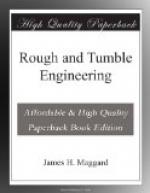Allow me just here to tell you how to construct a good tank for a traction engine. You can make the dimensions to suit yourself, but across the front end and about two feet back fit a partition or second head; in the center of this head and about an inch from the bottom bore a two inch hole. Place a screen over this hole on the side next the rear, and on the other side, or side next front end, put a valve. You can construct the valve in this way: Take a piece of thick leather, about four inches long, and two and a half inches wide; fit a block of wood (a large bung answers the purpose nicely) on one end, trimming the leather around one side of the wood, then nail the long part of the valve just above the hole, so that the valve will fit nicely over the hole in partition. When properly constructed, this valve will allow the water to flow into the front end of tank, but will prevent its running back. So, when you are on the road with part of a tank of water, and start down hill, this front part fills full of water, and when you start up hill, it can not get back, and your pumps will work as well as if you had a full tank of water, without this arrangement you cannot get your pumps to work well in going up a steep hill with anything less than a full tank. Now, this may be considered a little out of the engineer’s duty, but it will save lots of annoyance if he has his tank supplied with this little appliance, which is simple but does the business.
A boiler should be washed out and not blown out, I believe I am safe in saying that more than half the engineers of threshing engines today depend on the “blowing out” process to clean their boilers. I don’t intend to tell you to do anything without giving my reasons. We will take a hot boiler, for instance; say, 50 pounds steam. We will, of course, take out the fire. It is not supposed that anyone will attempt to blow out the water with any fire in the firebox. We will, after removing the fire, open the blow-off valve, which will be found at the bottom or lowest water point. The water is forced out very rapidly with this pressure, and the last thing that comes out is the steam. This steam keeps the entire boiler hot till everything is blown out, and the result is that all the dirt, sediment and lime is baked solid on the tubes and side of firebox. But you say you know enough to not blow off at 50 pounds pressure. Well, we will say 5 pounds, then. You will admit that the boiler is not cold by any means, even at only 5 pounds, and if you know enough not to blow off at 50 pounds, you certainly know that at 5 pounds pressure the damage is not entirely avoided. As long as the iron is hot, the dirt will dry out quickly, and by the time the boiler is cold enough to force cold water through it safely, the mud is dry and adheres closely to the iron. Some of the foreign matter will be blown out, but you will find it a difficult matter to wash out what sticks to the hot iron.




